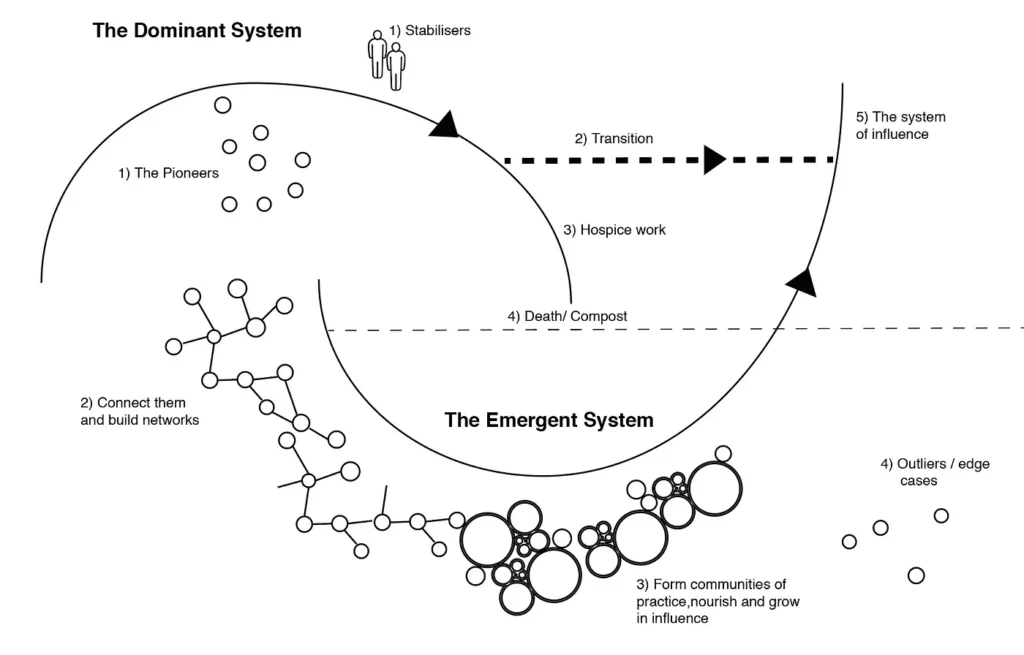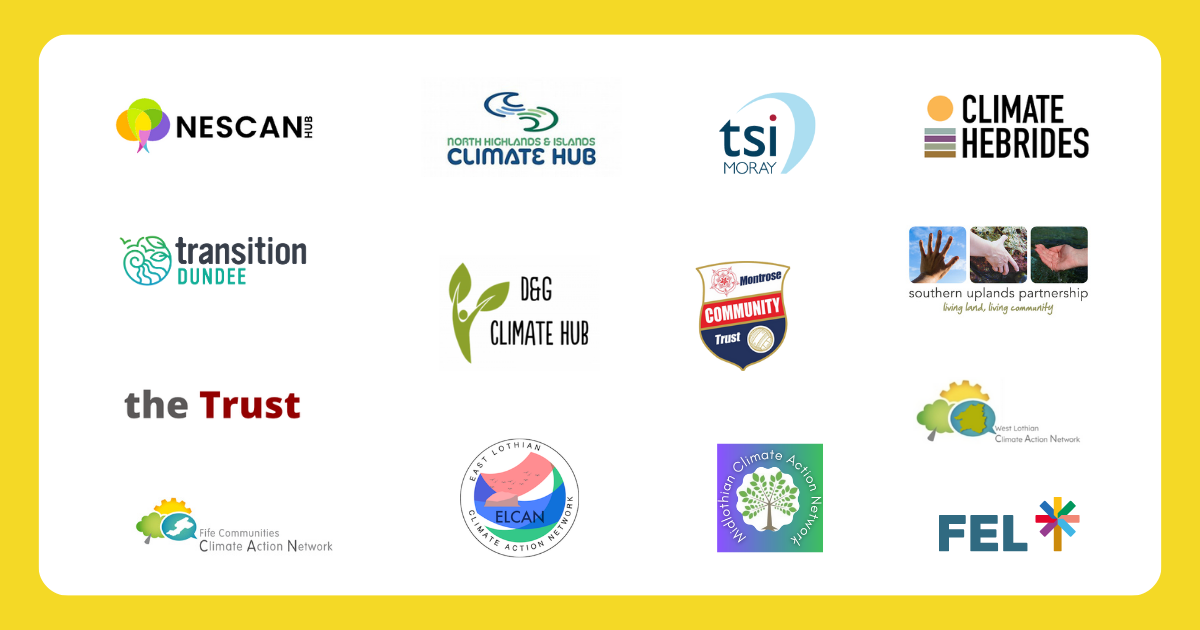SCCAN are delighted to announce progress in the development of a network of regional community climate action hubs in order to provide a strategic regional approach to climate change action across Scotland.
The hub network now consists of fourteen hubs with a number of hubs in development:
- Highlands and Islands Climate Hub, (covering the Highlands, Orkney and Shetland)
- NESCAN Hub (covering Aberdeen and Aberdeenshire)
- Fife Climate Hub
- Dumfries & Galloway Climate Hub
- Edinburgh Communities Climate Action Network
- East Lothian Climate Action Network
- Midlothian Climate Action Network
- Angus Climate Hub
- West Lothian Climate Action Hub
- Glasgow Climate Action Hub
- Scottish Borders Climate Action Network (SBCAN)
- Argyll and Bute Climate Action Network (ABCAN) Hub
- Moray Climate Action Hub led by tsiMORAY
- The Outer Hebrides Climate Action Hub led by Climate Hebrides CIC
- Inverclyde led by the Inverclyde Community Development Trust
- Forth Valley delivered by Forth Environment Link
- Dundee delivered by a partnership of organisation led by Transition Dundee
- Ayrshire Climate Hub delivered by a partnership of organisations led by The Energy Agency
SCCAN’s regional coordinators are working with their local stakeholder group to progress the development of their climate hub. Please contact your regional coordinators to get an update. Their contact details can be found here.
Hubs will work to:
- build awareness of the climate emergency and actions local groups can take
- develop local plans
- help groups take up funding opportunities
- facilitate networking
- ensure a more joined-up approach to tackling climate change at a regional level
You can read more about community climate action hubs on the Scottish Government website here.
Climate Hub Networks

The Scottish Government has now published its new guidance and information about their ambition to support the development of a Scotland wide network of ‘climate hubs’ to support community-led climate action. This follows a period of uncertainty about their commitment to follow through with expanding the number of climate hubs beyond the two existing, ‘pathfinder’ hubs: NESCAN Hub and Highland and Islands Climate Hub.
These ‘climate hubs’ are intended to enable a more strategic and joined up approach to supporting community-led climate action than was possible through the now defunct Climate Challenge Fund. SCCAN has been working with the Scottish Government to seek to ensure that these ‘climate hubs’ respond to the particular needs of communities across different regions through the way that they are structured and the services that they provide. Part of the intention of our Investing in Regional Networks project, now entering its second phase with confirmation of renewed Scottish Government funding, is to support the development of strong regional networks that can actively shape and design a ‘climate hub’ appropriate for their region.
This article explains why we think that support networks for community-led action are so important and a bit about the approach that we are seeking to take to support network development and collaborative ways of working.
Why Networks?
Since SCCAN was first established as a peer to peer support network in 2012, we have always seen our key resource as being the learning and experience accumulated by our members. Our main intention is to provide a structure that supports networking and the creation of a ‘knowledge commons’, so that members can support and learn from each other. Experience shows that mutual support and inspiration between those involved with community-led action is highly effective in creating widespread change and means that the impact of community-led action can be greatly amplified.
We believe that networking is crucial at all scales – within communities, regionally, across Scotland, the UK and beyond. Apart from our efforts to support networking between our members across Scotland, we therefore also work to build skills and capacity in our member groups, to support them to engage more widely within their own communities. We have also long sought to encourage the development of regional networks as well as actively engaging with UK, European and global networks of support for community-led action. Through being part of the Scottish Community Alliance we also seek to join up the climate agenda with the concerns of the wider community sector across Scotland.
Given the unprecedented challenges and uncertain future that we face, it is more important than ever that we are able to tap into everybody’s collective intelligence and knowledge so as to create locally appropriate solutions to meeting local needs. We believe that this is an essential part of enabling a rapid transition to a more resilient and localised future in which everyone is able to thrive within a flourishing environment, locally and globally.
We are inspired by the Berkana Two Loops model of understanding systems change. In this model, we see SCCAN’s particular role as being to try to connect the innovators who are building the new, emerging system, firstly into networks and then into ‘communities of practice’.
This is an excellent introduction to this model and is well worth reading before proceeding. Two Loops Guide.

Why regional networks?
SCCAN’s intention has always been to become a network of networks. This is because networking needs to happen at different scales to meet different needs. Networking at the regional scale can provide a key role because of the common interest between communities within a geographic region, the opportunities to develop collaborative projects and to build on potential synergies and the necessity to build strong relationships with local authorities, health boards, TSIs and other regional level bodies.
We have always held up the example of Fife Community Climate Action Network which over many years has successfully involved a diverse range of communities and groups, has built strong links with Fife Voluntary Action (TSI), Fife College, University of St. Andrews, Fife Council, the Fife Community Planning Partnership and others and has developed a range of collaborative projects such as Cosy Kingdom. Back in 2015, we were able to play a small part in supporting the development of FCCAN through accessing lottery funding for a part-time coordinator for one year. We saw the transformative effect this had in strengthening the network. It has since gone from strength to strength, has attracted significant funding for community projects and has recently had an application to host a regional community climate action hub approved.
Subsequently we have done what we can to support and nurture the development of stronger networks in other regions. However, until now these networks have been dependent on volunteers and we have not succeeded in securing funds to pay for any coordination/facilitation role – which in our view is crucial to network development. We were therefore very excited to receive funding from the Scottish Government in March 2022 for the first phase of our Investing in Regional Networks’ project which enabled us to recruit and pay a team of regional network coordinators who are now at different stages in supporting the development of networks in thirteen regions across Scotland.
Stages in network development
While the following phases of developing a new network, based on the Two Loops model, offer very helpful guidance and a useful theoretical framework, in practice, network development needs a lot of nuance and sensitivity to the specific context. What works well in one region may not work in another. The phases outlined below do not necessarily happen exactly in order or separately from one another. While guidelines and route maps are very useful, this work needs to be emergent and specific. We need to review and reflect and work with feedback loops so that we can continue to respond to what’s actually happening, rather than what we expected to happen. Time-based grand plans can easily go astray in this kind of process and developing the experience, patience, skill and confidence to take the next small wise step is an ongoing task!
Naming
Mapping and ‘naming’ the pioneers, so that they are identifiable and recognizable, serves the function of them being able to find each other. Just this act of naming is a way of starting to create new structure and order.
In our context, we need to recognise that the root causes that are driving poverty and deprivation are the same as those driving the climate emergency so we are not just seeking to map groups that are explicitly addressing the climate emergency.
Connecting
With ‘naming’, people can find each other and as they start to learn from each other they start to connect. Networks form as people are free to bring their interests and agency. The purpose and structure at this stage still resides with the individuals as they choose to join or leave at will. Key to recognise is that this stage is all about developing a real sense of connection and trusting relationships -and that relationships develop between individuals (not the groups/organisations that they may be part of or representing).
We can support people to connect through a variety of means, including maps, events, websites, online platforms (VIVE) etc.. As real networking activity and opportunities for collaboration develop this should attract many more people and groups to want to be part of it.
Nourishing
Most networks are quite transitory and fade away over time, but sometimes, if it continues to be nourished, a network may develop into something more; a community of practice. Communities of practice are ways that we can start to stabilise the new formation. The difference between a network and a community of practice is that the community of practice has its purpose outside the agency of any of the actors, there is now something to hold it together that needs nurturing. There is something more than the individual parts, as shared purpose and agency form things start to stabilise with structure.
Investing time in group formation is essential to build a strong foundation for future activity. In parallel with a programme of activity to support networking, a possible approach would be the formation of a ‘Local Implementation Group’ of representatives from organisations that have joined the network. This relatively short-life, ‘caretaker’ group should be as diverse as possible with representatives that are prepared to commit to laying the groundwork for the future working culture and governance of the network. A group of around ten, with as much diversity of age, gender, geography, background etc. as possible would be ideal. Once selected, this group should work together through key elements of establishing a group culture for effective collaboration including:
- Create a group agreement (and values for a collaborative, open and inclusive working culture)
- Develop a Vision and Mission statement
- Agree key principles and processes for how meetings are facilitated and decisions agreed
- Agree a future governance structure for the network -for example based on sociocratic circles and principles (see below)
The role of SCCAN’s network coordinator is intended to be to guide, support and facilitate, but not direct, this process – and any application to secure funding to host a climate hub.
A note on ways of working
We see climate change not as a cause of environmental issues (though it undoubtedly does cause them), but as a symptom of a way of doing things that also causes many other issues including poverty, social stratification based on gender, race etc and unprecedented damage to the fabric of the ecosystems we rely on for survival. This way of doing things comes from a mindset which can be summarised as domination or ‘power-over’.
Attitudes learned growing up within a system of ‘power-over’ live, often unnoticed, inside each of us, between us, in our social structures and processes. From infancy, through school and on into higher education or work, we have been taught this way of being in a multitude of subtle – and not so subtle – ways. When habits are as deeply embedded as this, we often don’t even notice patterns of hierarchy or power over even when they affect our lives.
So even if we were somehow able to ‘solve’ climate change, unless we are able to shift the underlying mindset, another existential crisis would take its place. This difficult situation requires that we give attention, not just to what we do, but to how we do it. Finding alternatives to dominating ways of working and the assumptions behind them is crucial to our ability to tackle the underlying issue and create meaningful change.
SCCAN is seeking to find creative ways of working together which actively encourage diverse perspectives and enable good deliberation, review and reflection and which use effective feedback loops to improve and develop our alternative ways of working. To this end, we have been gradually building a Sociocratic way of working over a number of years, as an approach to use for our own meeting processes and in creating a decentralised structure that disperses power and gives autonomy to those implementing different aspects of SCCAN’s work. This is not just a design choice, the need to develop ‘power-with’ skills, structures and decision making is a crucial part of the systemic transformation that we are working for. See also SCCAN’s Values statement
We want this collaborative approach to run right through all our projects and to shape how we relate to other organisations. That said, we are happy to acknowledge that we are still experimenting and making mistakes and falling short. Part of what we are trying to do is to ensure that there is time for review and reflection and space for honest feedback as we try to find and learn better ways of working and collaborating to build the community resilience we are certainly going to need in the challenging times we are facing.

